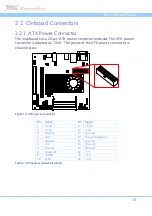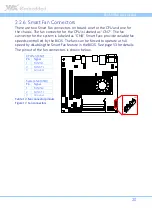
EPIA-M900 User Manual
13
2.1.2.
VGA Port
The integrated 15-pin VGA port uses a female DE-15 connector. The pinout of
the VGA port is as shown below.
Figure 7: VGA port pinout diagram
Pin
Signal
Pin
Signal
Pin
Signal
1
RED
6
Ground
11
VGP_20
2
GREEN
7
Ground
12
SDA
3
BLUE
8
Ground
13
HSync
4
NC
9
+5V
14
VSync
5
Ground
10
NC
15
SCL
Table 2: VGA port pinout
Summary of Contents for EPIA-M900
Page 1: ......
Page 2: ...1 00 06102011 110900 USER MANUAL EPIA M900 Mini ITX embedded board ...
Page 15: ...EPIA M900 User Manual 7 Figure 2 Layout diagram of the EPIA M900 mainboard bottom view ...
Page 18: ......
Page 40: ......
Page 48: ......
Page 52: ......
Page 80: ......
Page 82: ......
Page 86: ......














































